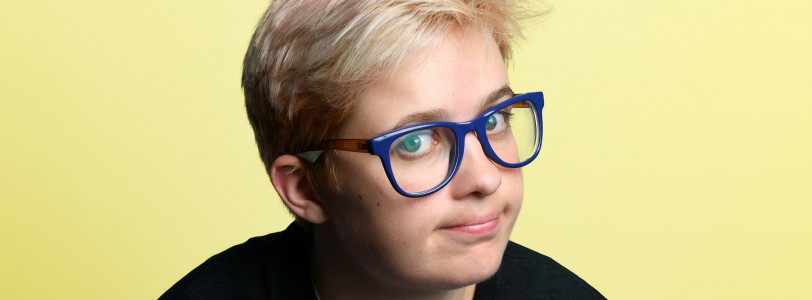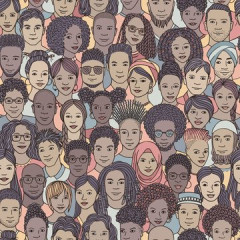Could you first introduce yourself to the reader?
Hello! My name is Cerys Bradley. I am a stand-up comedian. I’m also a podcast producer, a writer, a science communicator, and a debate coach. Some relevant facts about me – I’m queer. I’ve previously written shows about being bisexual, about the history and evolution of queer language and about scientific research on the queer community. A lot of my material at the moment is about being non-binary. I’m also autistic. I was formally diagnosed during the pandemic so I talk about this in my show and I do lots of writing about being neurodivergent. And the other thing that’s worth mentioning is I play rugby despite not being very good at, or really enjoying, sports. This is what inspired my show, Sportsperson, in the first place.
How would you describe your show?
It’s fun! The show is called Sportsperson and it’s about whether or not I’m a sportsperson (I’m not) and lots of other labels and identities that I (and I think other people) have a tendency to overthink or worry about. There’s some props and prizes and audience interaction and it all gets a bit silly towards the beginning, the middle and the end.
Why do you want to perform at Edinburgh Festival Fringe?
I like deadlines and being able to say that I’ve done the thing that you’re supposed to have done. Also, I’ve been working on my show for a year and thinking about it for longer and I want to show it off to everybody and then say that people came and I didn’t just perform to an empty room every day.
What differentiates it from other festivals?
It depends on how you do it but, for me, a big difference is the length of the run. Doing the whole month is what differentiates it from weekend festivals where you just do your show once or, even, when I’ve done week-long runs at festivals like Brighton Fringe. It’s quite a unique experience to be able to develop the show day-to-day, really hone it and to fall in and out of love with it. Also, you know, it’s the biggest arts festival in the world and so the scale and the number of shows and everything being in one place is wild.
What first motivated you to enter the industry? Who were your inspirations?
When I was in secondary school, Natalie Haynes delivered a stand-up comedy workshop and we participated in a national youth competition. At the time I was pretty into mainstream comedy, especially panel shows and sitcoms. If it was on at 9pm on a Thursday (on Channel 4) or Friday (on BBC) I wanted to watch it. My idols were Dylan Moran and Bill Bailey and so I signed up immediately when the workshop was announced in assembly. I made it through to the final and completely bombed at the Newbury Corn Exchange in front of an audience of maybe 15 people. But the semi-final went really well and I was hooked on the feeling of performing from that point.
How has your background, upbringing and education had an impact on your artistic career?
I think the biggest impact these things have had on my artistic career is space. I grew up in South Gloucestershire and went to a grammar school quite far from where I lived so I didn’t socialise much outside of school and spent a lot of time by myself, in my own head. It was a good school and there was an expectation of going to university which meant moving to London and getting the opportunity to try a lot of things. When I graduated, I stayed in higher education and did a Master’s and a PhD which didn’t quite work out the way that I wanted them to but did give me an extra five years to figure out a lot about myself and do a lot of side projects. I’ve dipped in and out of comedy throughout the past ten years or so and being a student is very compatible with that. Through my PhD, I met people who performed science comedy and that was a cool diversion where I could experiment with a lot of performance styles and develop my skills. So, yes, I’ve been very lucky (privileged) to work on my artistic career at my own pace and fit it around and in all of my other careers.
What is your earliest childhood art memory?
The first one that comes to mind was year 5 or 6. I can’t remember exactly what we were doing but I do remember being the first person to finish and proudly taking my piece up to my teacher and her telling me that I always rushed things and to go and do it properly which was very upsetting to me given that I was 1) 10 years old and 2) had fulfilled the brief set out for the task and therefore did not understand what “do[ing] it properly” meant in this context if it wasn’t what I had done. I’m still salty about it.
If you didn’t have your current job, what would you probably be doing?
Who knows. I’ve had a lot of jobs and have also applied for tons of jobs that I didn’t get. I’m going back to school in September to get my PGCE so probably teaching.
Did Covid-19 change the way you create work? Do you approach shows with a different mentality now?
Yes, definitely. I think my style has become a lot sillier over lockdown. This has partially been deliberate – my tastes have changed. When I watch comedy now, what I really want to see is something absurd and escapist that makes me laugh and then maybe I can think about it later. I don’t want to sit through some jokes (good as they may be) and then a very earnest speech on what the artist really thinks about stuff. But, also, I’ve spent most of the past two years in a fairly small flat with just my partner trying to make each other laugh and so my style has evolved and adapted to that very specific audience.
I would say the other way the pandemic has changed my style is I now don’t enjoy working solo as much. One of the first things I did when planning this show was look for a director (who I found in the very wonderful Joz Norris). This was because I spent most of lockdown in my bedroom editing audio by myself and so my day-to-day work was very lonely and I wanted an excuse to meet up with people and “bounce ideas off each other” and also doss around and procrastinate and have fun.
Describe the last year in 5 words or less?
Just do it 2022.
Do you subscribe to the idea that art should be exempt from ‘cancel culture’?
I mean, I could write a whole essay on this but I’ll try to keep it brief. I don’t think we’re living in a “cancel culture”. I think we’re experiencing the democratisation of art criticism. I love the fact that if I, or anyone else, sees a piece of art, we have a platform to express our views about it and the ability to connect with other people and hear what they think. Having so many opinions available does mean that, as both an artist and an audience member, I have to be more discerning about which opinions I trust and why, but we should all be thinking critically about the content we consume pretty much all of the time anyway.
I think the current conversation about cancel culture, and the term itself, is unhelpful and a tactic being used by people who don’t believe their very precious right to free speech should be extended to everyone or allowed to go both ways. So, no, I guess I don’t but I disagree with the premise of the question as well.
If you could work with anybody, from any point in history, who would you pick and why?
I’m currently working on a bit where I interview Sigmund Freud about his opinions on homosexuality (which are quite contested from a historical perspective) and it would be a lot easier to put together if he was physically here and able to write his own lines, so I guess him. This way the audience would also be spared my terrible Sigmund Freud impression.
What advice would you give to someone who wants to take a show up to the fringe?
If you’ve never done it before, do something with friends. I’ve done a few shows at the fringe before – an improv show and split bills and so I’ve never gone alone. Even this year I’m working with a whole team of people (I have a producer, a director, my agent, a publicist, and a technician). Having a support network of people you trust is invaluable and putting on a show with other people means you can also share the admin and promo work.
When and where can people see your show?
I’m on at 4:40pm in the Wee Room, Gilded Balloon every day except the 15th.
And where can people find, follow and like you online?
I’m @hashtagcerys on Instagram and Twitter and my website is cerysbradley.com (which is where you can sign up to my newsletter).
Cerys Bradley: Sportsperson is at the Gilded Balloon Wee Room at 4:40pm from 3rd – 29th August. For tickets go to www.edfringe.com









0 Comments